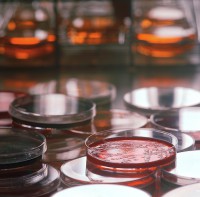
Eating a high-fiber diet is generally recommended to help prevent colon cancer, although there is debate within the cancer community about its effectiveness as a preventive measure.
A new study on mice adds to the debate by suggesting that cancer protection may have as much to do with the type of bacteria that live in your gut as with diet. In experiments with mice, researchers at the University of North Carolina School of Medicine found that consumed fiber was fermented into the chemical butyrate when a certain type of bacteria was present in a mouse’s gut. The formation of this chemical appears to be critical to colon cancer prevention – at least in mice.
Mice with the butyrate-producing gut bacteria had a 75% lower incidence of colon cancer tumors than mice whose guts did not contain the bacteria. In control experiments, neither a high fiber diet alone nor the combination of butyrate-producing bacteria with a low-fiber diet had any effect on reducing colon cancer.
“Our study shows that it’s not the high fiber in and of itself that has a protective effect against cancer, but it’s a combination of the fiber plus having the right types of bacteria,” Scott Bultman of the University of North Carolina told Fox News.
Bultman explained that healthy colon cells use butyrate for fuel. Because cancer cells use sugar glucose for fuel, not butyrate; researchers suspect that butyrate collects inside the cancer cells, eventually causing their destruction in some, as yet, unknown way.
Studies on people have explored the effects of a high fiber diet on colon cancer with mixed results. Future studies will need to examine the potential impact of gut bacteria on colon cancer. Visit our website to find out how Issels integrative immunotherapy has successfully helped colon cancer patients achieve long-term remission.
